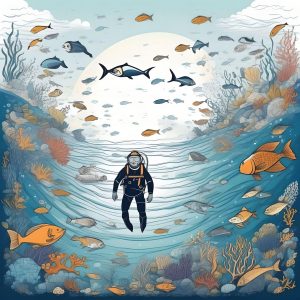
Fotor AI, prompt by Vesna Bulatovic
Last week’s webinar inspired me to question myself, am I a digital Resident or a Visitor? White and Le Cornu’s framework suggests that Visitors view the web as a toolset, while Residents see it as a community – a place to connect and share with others (White & Le Cornu, 2011). I use various platforms and tools in my private mode, but I rarely dive deeper, hesitant to leave a lasting “footprint”. This got me thinking – how does my private digital identity compare to my role as a university teacher, where I actively use technology to connect and collaborate with my students and colleagues?
As a university teacher, I navigate various platforms with ease, using educational technology like Microsoft Teams and Moodle to connect with students and share resources with colleagues on platforms like ResearchGate and LinkedIn. I feel quite comfortable, almost at home in professional waters, sharing knowledge and resources. However, on social media, especially in comment sections, I worry about misinterpretation or being perceived as someone with less knowledge or outdated. I admit I’m comfortable posting on Instagram, as my profile is private and accessible only to my family and friends. This might seem contradictory to my openness in professional environments, and I am aware that I haven’t yet fully explored the interactive potential of social media. At present, I can say that I’m a capable swimmer, but I also recognize the fact that I need to push my boundaries and step outside my comfort zone to become more proficient. Perhaps engaging in meaningful online dialogues, even with the risk of judgment, could be a valuable step forward.
So, am I a seasoned diver or merely a snorkeler in the digital age? Perhaps the answer lies somewhere in between. White and Le Cornu (2011) also suggest that someone might be a Resident in their personal life but a Visitor professionally or vice versa, switching between Resident and Visitor approaches online depending on the context. By acknowledging my current limitations and trying to push my boundaries, I hope to evolve into a more confident and impactful digital citizen, both personally and professionally. As Beetham and Sharpe (2010) say, digital literacy is a journey that starts with basic abilities evolves into advanced skills, and even shapes our identity. After all, even experienced divers started somewhere, and the best way to learn to swim is to take the plunge.
References
- White, D. S., & Le Cornu, A. (2011). Visitors and Residents: A new typology for online engagement. First Monday, 16 (9). https://firstmonday.org/ojs/index.php/fm/article/download/3171/3049
- Beetham, H., & Sharpe, R. (2010). Rethinking Learning for a Digital Age. Routledge.
Alexandra Doroftei says:
I really can relate to your comment! As Helen Hayes once said, ‘The expert at anything was once a beginner.’ Perhaps we are not beginners since we use the tools, but we are becoming more aware of our actions. 🙂
March 7, 2024 — 9:51 am
Vesna Bulatović says:
Thank you for your comment Alexandra!
March 7, 2024 — 9:58 am
Dragana Vukovic Vojnovic says:
I share your feelings, Vesna! In our professional lives, it is much easier to connect, but many of us are not ready to share so much of our private lives – unlike the TikTok generation. However, both ways are fine, and as we have learned so far it is a spectrum of behaviors and a journey.
March 10, 2024 — 8:54 am
Vesna Bulatović says:
Thank you for your comment Dragana!
March 10, 2024 — 9:05 am
Jonathan Phan says:
I love how you explained your digital citizenship as exploring the depths of the ocean! It also shows that choosing to become a resident or visitor for a specific occasion ultimately evolves into the adventure and experiences we create: “Do I want to snorkel today? Or should I prepare my scuba gear?”
March 10, 2024 — 4:22 pm
Vesna Bulatović says:
Thank you for your comment Jonathan!
March 10, 2024 — 4:25 pm
Jonathan Lian says:
Hi Vesna, I like the picture that you generated with Fotor AI. I must try it out. 🙂 I also appreciated your sharing to be a “more confident and impactful digital citizen”. Indeed, we need to hone our digital literacy skills so that we can be impactful and responsible in our respective spheres of influence. Thank you for being an “impactful citizen” in our PBL group. Regards, JL
March 30, 2024 — 8:50 am
Vesna says:
Tnank you for your comment JL!
March 30, 2024 — 9:04 am